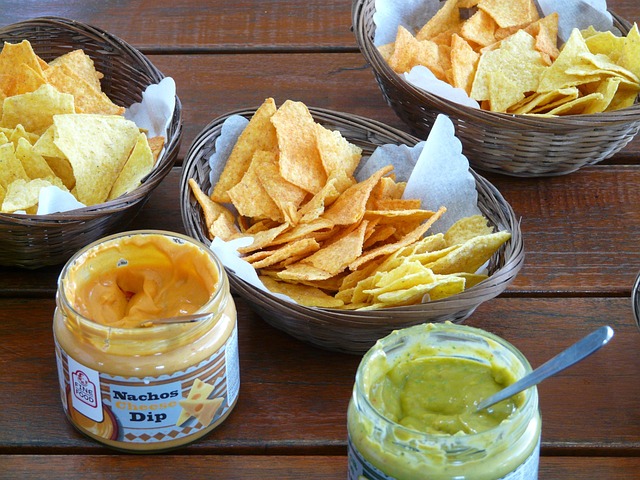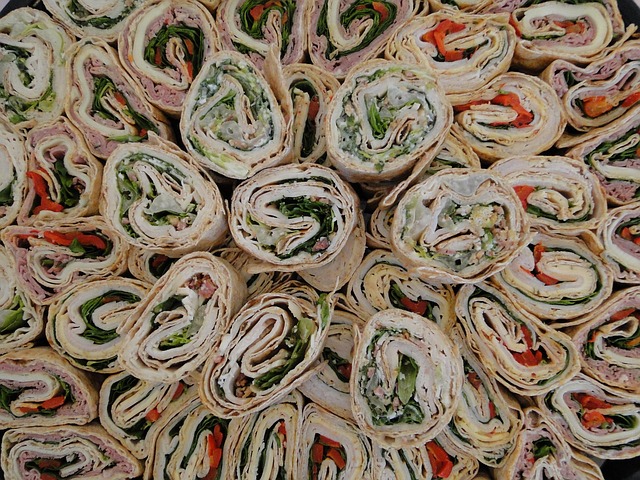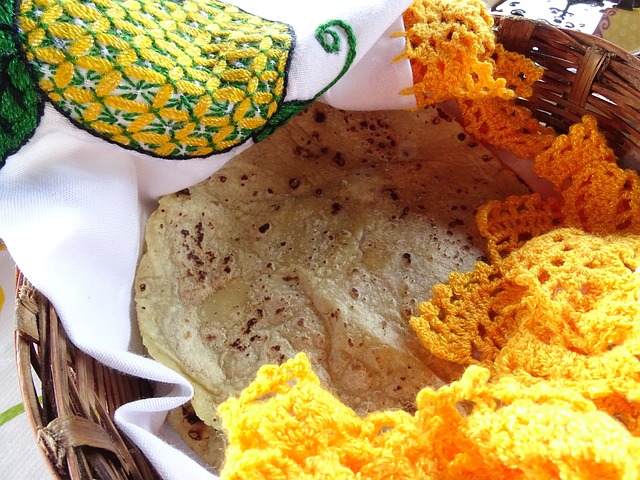Mexican cuisine is a rich cultural tapestry blending indigenous flavors with Spanish influences, celebrated for its vibrant ingredients, bold spices, and traditional techniques. Mission Non-GMO Tortilla Chips, made from naturally grown corn, are a symbol of this heritage, offering a crispy texture and authentic taste that enhance various Mexican dishes. Corn, a staple crop in Mexico, is integral to local cuisines, with diverse regional varieties reflecting the country's culinary creativity. These chips, produced using time-honored methods, serve as both a side dish and flavor canvas for dips like salsa and guacamole, uniting people globally in a shared love for traditional Mexican food.
“Unleash a burst of authentic Mexican flavor with Mission Non-GMO Tortilla Chips, a modern twist on an ancient tradition. This article delves into the rich culinary heritage of Mexico, exploring its diverse regional cuisines and the cornerstone ingredients that define its dishes. We uncover the profound role of corn in Mexican dining, from traditional tortilla making to the evolution of crispy chips.
Meet Mission Non-GMO, a brand dedicated to preserving quality and transparency through non-genetically modified ingredients and sustainable practices. Discover how their tortilla chips maintain the authentic taste and texture that make them the perfect companion for diverse Mexican fare.
From classic dips to innovative pairings, we guide you through a culinary journey, showcasing how Mission Non-GMO Tortilla Chips enhance the experience of savoring genuine Mexican cuisine.”
- Understanding Traditional Mexican Culinary Roots
- – Explore the historical context of Mexican cuisine and its diverse regional variations.
- – Highlight key ingredients and cooking methods that form the basis of authentic Mexican dishes.
- The Role of Corn in Mexican Cuisine
- – Discuss the significance of corn (maize) as a staple crop in Mexico and its various forms.
- – Explain the traditional processes involved in making corn tortillas, emphasizing their importance in authentic Mexican dining experiences.
Understanding Traditional Mexican Culinary Roots

Mexican cuisine is a vibrant tapestry woven with centuries of culinary traditions, influenced by indigenous cultures and shaped by historical events. At the heart of many iconic Mexican dishes are simple yet flavorful ingredients, alongside techniques passed down through generations. One such staple that has become synonymous with Mexican fare is the tortilla chip, specifically the crispy variety made from non-GMO corn tortillas. These chips are more than just a side—they represent a cultural symbol of Mexico’s rich heritage and culinary craftsmanship.
The origins of traditional Mexican cooking can be traced back to the indigenous peoples who first cultivated corn, beans, and chili peppers, forming the foundation of many modern dishes. Over time, Spanish colonization introduced new ingredients and cooking methods, resulting in a fusion of flavors that is uniquely Mexican. Today, authentic Mexican cuisine is celebrated worldwide, with one of its most beloved components being the crispy tortilla chip, often crafted using Mission non-GMO tortillas to ensure quality and simplicity.
– Explore the historical context of Mexican cuisine and its diverse regional variations.

Mexican cuisine is a vibrant tapestry woven with centuries of history and cultural influences, creating a diverse culinary landscape across its many regions. From the bustling streets of Mexico City to the rustic villages in Oaxaca, each area boasts unique flavors and traditional dishes that have evolved over time. This rich culinary heritage is characterized by an array of fresh ingredients, bold spices, and time-honored techniques passed down through generations.
Historically, Mexican food has been shaped by indigenous traditions, Spanish colonization, and subsequent cultural exchanges with other immigrant communities. One beloved staple that exemplifies this blend of influences are Mission Non-GMO Tortilla Chips. These crispy treats have become an iconic symbol of Mexican cuisine worldwide, offering a taste of tradition with every bite. With their authentic preparation using natural ingredients, they cater to modern consumers’ demands for healthy, non-genetically modified options while paying homage to the ancient culinary roots that define Mexico’s gastronomic identity.
– Highlight key ingredients and cooking methods that form the basis of authentic Mexican dishes.

The heart of Authentic Mexican cuisine lies in its vibrant, fresh ingredients and time-honored cooking methods. At the very foundation of many dishes is a blend of high-quality, Mission Non-GMO Tortilla Chips, crafted from naturally grown corn and cooked in traditional stone ovens to achieve that perfect crispy texture. These chips serve not only as a delicious side but also as a canvas for bold flavors.
Other key elements include fragrant spices like cumin and chili powder, fresh cilantro and onions, zesty lime juice, and rich, creamy ingredients such as avocado or salsa. Cooking methods range from slow-roasting vegetables to sautéing spices and meats, resulting in dishes that are both comforting and complex in flavor. This combination of simple, yet carefully selected components is what truly defines the authenticity of Mexican cuisine.
The Role of Corn in Mexican Cuisine

Mexican cuisine is renowned for its vibrant flavors and rich history, with corn playing a central role in many traditional dishes. This staple crop has been an integral part of the country’s culinary landscape for centuries, shaping the way food is prepared and enjoyed. One of the most iconic Mexican foods, tortilla chips, is a perfect example of corn’s versatility. Made from ground corn masa, these crispy treats are a beloved snack both in Mexico and worldwide.
In the context of authentic Mexican cooking, Mission Non-GMO Tortilla Chips stand out as a high-quality option. The use of non-genetically modified corn ensures that the chips maintain their traditional taste and nutritional value. These chips are not just a side dish; they serve as a canvas for various salsas, guacamoles, and dips, enhancing the overall dining experience.
– Discuss the significance of corn (maize) as a staple crop in Mexico and its various forms.

In Mexico, corn (maize) holds a place of immense cultural and culinary significance. This staple crop forms the very foundation of many traditional dishes, with its versatile uses spanning from tortillas to tamales, and even as a key ingredient in beverages like tequlla. The country’s diverse regions cultivate various types of maize, each with unique characteristics that influence flavors and textures in local cuisines. This diversity is a testament to Mexico’s rich agricultural heritage and the creativity of its chefs.
When it comes to tortilla chips, especially those made from Mission Non-GMO Tortilla Chips, corn remains the star ingredient. These chips, known for their crispy texture and authentic taste, showcase the best of Mexican culinary traditions. By using high-quality, non-genetically modified corn, manufacturers prioritize both flavor integrity and sustainability, ensuring that every bite transports you to the vibrant landscapes and bustling markets of Mexico.
– Explain the traditional processes involved in making corn tortillas, emphasizing their importance in authentic Mexican dining experiences.

In traditional Mexican cuisine, corn tortillas hold a central place, serving as the foundation for countless dishes and culinary experiences. The process of making them is an art that has been passed down through generations, preserving cultural heritage and ensuring authentic flavors. Using only natural ingredients, such as non-GMO corn, lime, and salt, these tortillas are crafted by hand, allowing for a level of precision and care that industrial processes cannot match. Each chip is carefully formed from fresh masa, a dough made from ground corn, resulting in a texture that’s both pliable and crisp when cooked.
The traditional method involves cooking the corn in lime-infused water, which not only adds flavor but also helps to soften the corn’s starch, allowing for a smoother, more tender tortilla. After cooking, the corn is ground into masa, which is then shaped into small patties and hand-rolled into thin, circular shapes. This labor-intensive process ensures that every chip retains its authentic Mexican character, making them an indispensable element in any dish, from tacos to guacamole, and a key component in creating memorable dining experiences.
In light of Mexico’s rich culinary history and diverse regional influences, authentic Mexican cuisine, characterized by its vibrant flavors and traditional ingredients like corn tortillas, continues to captivate palates worldwide. The making of corn tortillas, a process deeply rooted in the country’s heritage, is pivotal to the overall dining experience, especially when enjoyed with crisp, high-quality tortilla chips like Mission Non-GMO Tortilla Chips. By embracing these authentic elements, we not only savor the past but also celebrate the vibrant culinary landscape of modern Mexico.
